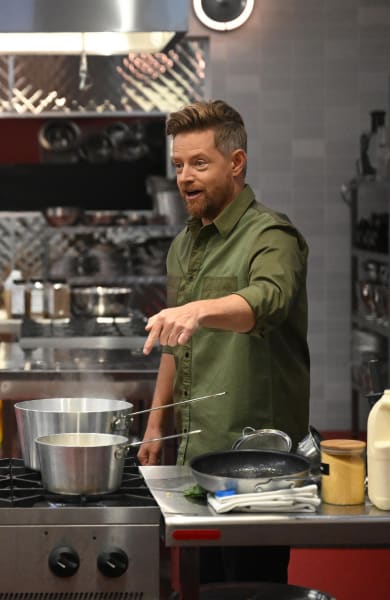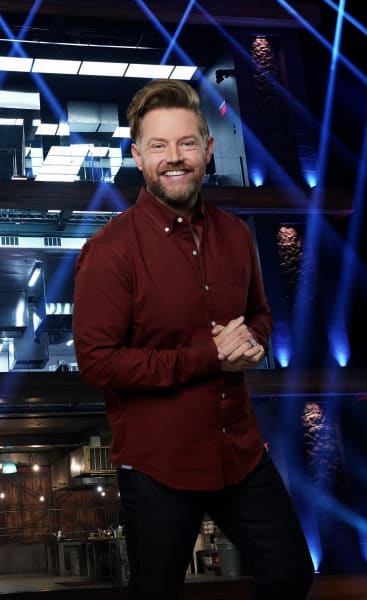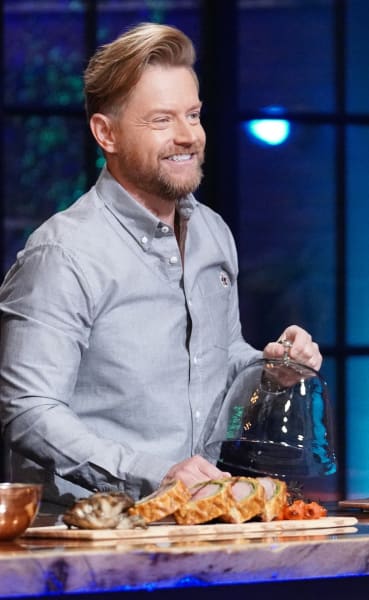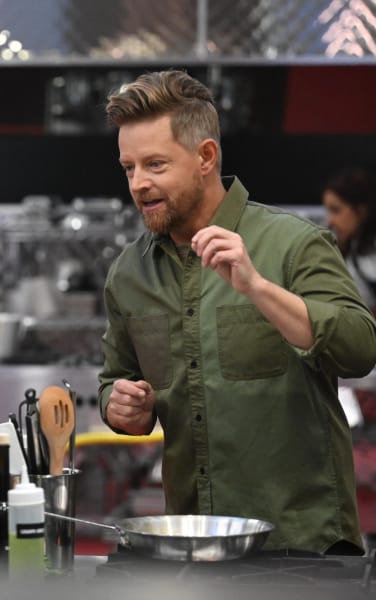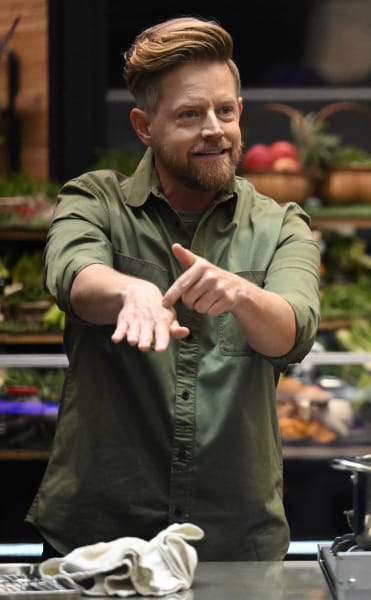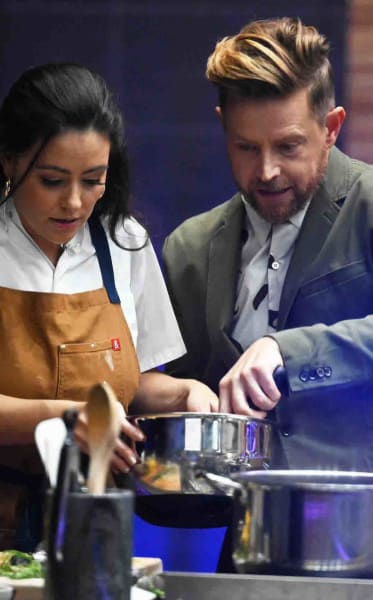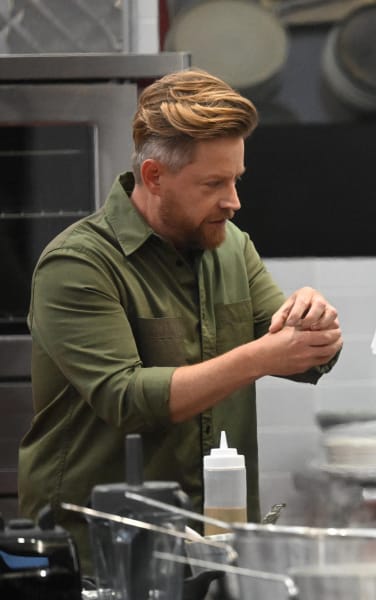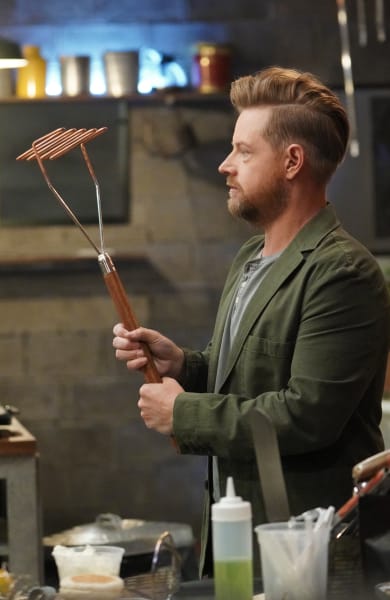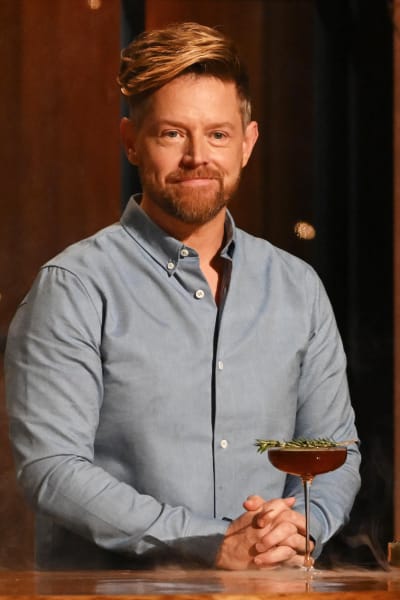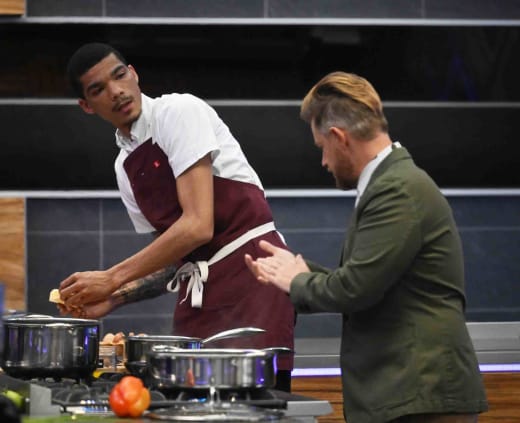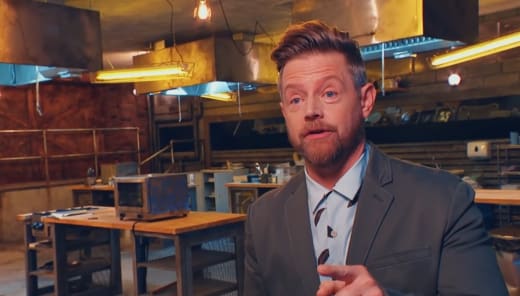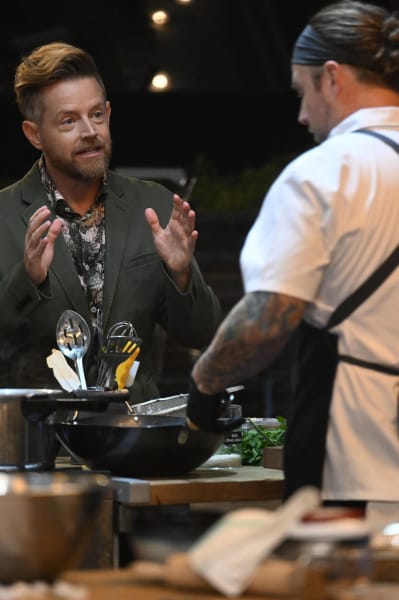Next Level Chef on FOX is more than a cooking competition as it has a level (pun intended) of psychological warfare built into its format.
Chef Richard Blais, alongside Chef Gordon Ramsay and Chef Nyesha Arrington, is tasked with mentoring contestants to help elevate their dishes and smooth over the psychological waters they’re navigating during the competition.
We had the chance to chat with Chef Blais, and he offers insight into the competition and shares the strengths of the contestants going into the final two hours.
I really, really enjoy Next Level Chef.
Thank you so much. So do I.
It’s such a unique format.
Yeah, actually, I watch it as a viewer as well, and it is. That’s the thing that I love, especially with the three floors. I don’t get to see what happens on the other two floors that I’m not on. There’s a lot for me to see.
That’s true.
My family loves it, which is rare for them to love the things that I’m filming, and so many people are stopping me now saying that they love the show. Thank you for that. It’s pretty special.
How is it watching it compared to being a part of it?
It’s surprisingly — even knowing some of the things that are going to happen — as tense. Again, I don’t get to see any of the cuts or any of the editing. We did film a little bit out, so you’re like, “Oh man, I remember that moment.” But it’s so exciting.
I will turn on some other cooking shows every once in a while to just see what’s going on, and then I realize what a special thing we have and how much natural tension and competitive spirit we have baked into it.
Then just things that I’m a dork about, like the lighting and me trying to look very Wes Anderson in this video right here. It’s just that everyone does such a great job on the show, cast and crew alike. It’s fun to watch.
It’s like a built-in psychological challenge when people get relegated to that basement, especially. Where on earth did they get that myriad of kitchen essentials that are so battered and bruised?
I love that. It is my favorite. It is. Unfortunately, it’s my place. I find myself in a lot down there with my team, but it’s my favorite part of the three stories for sure. I love the lighting down there. I love that the equipment is so old, and you’re like, “Oh yeah, I remember my grandma had a giant bent spoon like this.”
I think it’s actually, not to get too inside baseball on Next Level Chef here, but I think it’s actually sometimes an advantage for the chefs down there. Because they don’t have to think as much.
They can only grab whatever’s there, and then they just have to go. They might be used to just cooking with a pan and a spoon, and one knife anyway. Right? It helps sometimes.
I think that what you said makes sense, especially because of what we’ve learned about having the time token this season. It has not done for anybody what they expected. Why do you think that is?
Yeah, I don’t quite know. You’re right. On social media, it’s become the curse of the time token it seems, which I think is a hashtag I’ve seen. I think one is, I think everyone inside, because we have such a great crew, they want to use the extra time for themselves.
I think probably the best thing to do with it is to take time away from someone else because if you go from 20 seconds to 10 seconds, could you even imagine?
Just try to go run to your own fridge at home right now and grab a bunch of ingredients in 10 seconds or 15 seconds, whatever it is. I think it’s psychology. Like you said, a little bit of psychological warfare. If you have it, if you don’t, what are you going to do with it? It’s been a nice twist.
In a competition like this, mentoring can make all the difference, especially when you’re on different floors, and you’re taking people from one level to the next, and they’re on top one second, and they’re in the basement the next.
What do you guys talk about behind the scenes? What’s your focus for mentoring these people and getting them through these challenges?
Yeah, we don’t talk about anything behind the scenes.
Oh, really?
Especially when it comes to mentors and cast. Everything you see, that’s it. Obviously, that cook might have been 45 minutes, and it has to get chopped up to fit the episode, but that’s the only time we interact with them.
Whenever you see us on camera, that’s the only time we’re with them. I wish that we could have a 30-minute pow-wow or a team meeting beforehand. That would help a lot.
That’s one of the challenges to being a mentor, especially early on when you have four or five people on your floor, is trying to figure out where to spend your time.
It’s one of the other reasons why I love watching the show as a viewer because now I get to see what Gordon does, what his management style is, how he coaches, and how he spends his time, what Nyesha does.
I take only the best bits of both of them and try to bring it into my own game. But it’s challenging to figure out what makes someone tick and let them run with it or help them conceptualize their dish.
It’s interesting you said that about watching it and getting tips from your fellow mentors because you really don’t want to share that information with each other because you don’t want them to win. You still want your team to win. So why would you share your tips?
A hundred percent. A hundred percent, yes. Again, we don’t… There’s no pow-wow with us, either. Of course, we’re friendly, but when we’re in front of the camera, that’s when the show is on.
When we’re behind the scenes, we’re talking about maybe where we’re going to dinner that night, but we’re not talking gameplay and strategy for sure.
How difficult is it to judge a dish in such a short time, and do you even have enough time to get a bite that gives you a real feel for the dish? I watch sometimes thinking, “Okay, I don’t even think you touched anything but the potatoes.”
Interesting. Yes, we do have time to get a bite. Yes, it is relatively quick. When a lot of people think, “Oh, you have such a great job. You just get to eat food and judge it in front of a camera.” It’s really, it’s a craft in and of itself, and it’s an art.
You have to be able to say within 30 seconds the good and bad of pretty much every dish that comes in front of you, less than 30 seconds. You have to articulate in a way that just doesn’t always say, “Ah, it could use some salt. It needs some vinegar.”
It is an art, and again, it moves fast. You have to be lightning-quick with what you say about these dishes. But it’s also easy, as everyone who goes out to eat knows, you sit down, you eat something delicious, and it’s easy to register, “That’s delicious. Now how do I tell everyone at home what made it delicious?”
I think for people at home, they tend to associate plating with the taste of the dish. A lot of times, something beautiful will come from a restaurant, and you’ll think, “Wow, it’s so beautiful.” Then even tasting it seems maybe more beautiful than it is just because it’s pretty. How does plating affect judging from that capacity?
Yeah. I think that’s the cool thing. I’m sorry, I’m stepping outside of just culinary competitions now. But that’s the cool thing about food competitions is that there is that unknown part because you just can’t taste the food at home.
But you can hear someone sing, you can watch someone dance, you can see a fashion designer and say, “Ah, I never would wear those pants.” But you don’t know quite what it tastes like. I think that you’re right.
If it’s beautiful, you might be like, “Oh, that’s great.” That’s why the judges — and we have to really be able to articulate, “Yeah, it looks great, but it had no salt on it,” or whatever it is. That’s a fun part of what we do, for sure.
Are there ever any dishes that you wish you could pull aside and finish right there because it was so good?
Definitely. Yeah, definitely. Especially this season, I’m thinking of a couple of dishes right now that there are some true lightning bolts of inspiration that come from our chefs, which is my favorite part of the show, is when the contestants inspire me when I didn’t help them at all, and I just packed up and let them do their thing.
I’m like, “Oh, you know what? Yeah, seaweed and vanilla. I’m going to go back to my restaurant and try that one day myself.”
Or when you see a dish and the fact that they had to cook it in 30 minutes, they had no ingredients. Everything’s crazy. You’re like, “Oh, this is a restaurant dish. This is a real…” I’m getting goosebumps. You can’t see it, but this is a really special dish.
It happens pretty much every episode or so, there’s one dish that’s that’s really, really special. When you get towards the end, usually multiple dishes.
It amazes me that these people, some of whom have never worked in an actual restaurant, just home cooks, can use the time to their advantage and pull ingredients. They have no idea what’s coming down the platform.
How hard is that really, even as an experienced chef like you, to just be thrown into that situation and create a good dish?
Yeah, well, we should do Next Level Chef home edition. Go to your neighbor’s house and just stand in front of their fridge. You don’t need the platform, but just stand in front of their fridge, set a clock for 30 seconds, open up their fridge, grab a bunch of things, and start cooking. It is so hard, so hard.
I’m in their shoes. I have so much empathy for our cast because I have competed, obviously, but not in this show. This is one of the toughest ones, if not the toughest, because of that platform moving and that you have to grab all your ingredients and you only have one shot.
It’s really, really, really hard. You might be Monday morning quarterback at home, and you’re like, “Why would you do that?” You’re like, you got 10 seconds. You grabbed elderflower syrup and a beef tongue because that’s what happens when you have 10 seconds. But yeah, it’s hard.
It’s also hard to get that dish back on the platform. We’ve seen many times this season where somebody has an absolutely fantastic dish, and either they leave off the ingredient that ties it all together, and it’s sitting back on their counter, or they miss the platform entirely, or it lands all askew.
How hard is that as a mentor to watch that? It must crush your heart.
It’s so hard, and there’s not a platform in most restaurants, but that’s the precision that has to happen in a great restaurant.
You have to plate it right before time, and it has to go into the window and go out to the table right at the last second. Our chefs are thrown into that competitive restaurant environment, except they have a moving platform.
Yeah, it’s thrilling. It’s hard. That’s part when I’m watching at home, and I don’t see the other floors, and they’re like, “Oh my God, they threw their dish.” I wasn’t on that floor. I heard something above me, but they threw their plate onto the platform.
I’m actually shocked, though, that more people don’t miss it, to be honest. I think people are always shocked that a couple of times that it happens. But I’m surprised it doesn’t happen every episode, to be honest. There are a lot of moving parts happening, and it’s hard; you’re so focused sometimes.
We might be right next to them counting down, but I get it. I get it for sure. It would not happen to me because I’m one of these people. I say that as I just got my kids to school, and my wife is like, “Why are you always 30 minutes early?” I’m just like that. But I totally understand it.
You know what? It’s interesting that the basement is at a disadvantage until it’s time to put your plate back on because it’s on the lower side. They have an extra second or two to get their dish on there without having to toss it like a Frisbee.
But the people on the top floor, I look at that sometimes and think, “There’s no way I’m getting it up there.”
[Richard is quietly applauding on Zoom] I don’t want to step on your audio. I’m applauding for you because you do watch the show, and I love those metrics. You’re like, “Oh, well, it is a second better to be in the basement,” or whatever it is. Yeah, you’re right. The nuance of the competition is just insane.
What’s been the most surprising things that have happened so far this season in your mind?
To me, the most surprising thing is, collectively, the quality of the food from all of the contestants, I think, pardon the pun, really went to the next level. Collectively as groups, they just cooked really, really well with some really amazing combinations.
I think the ingredients that were on the platform were maybe a bit odder — beef tongue or whatever it is, or hand dive scallops — and some really, really great chef ingredients. A couple of dishes have surprised me truly where I’m like, “Oh, that dish should be on a menu at a restaurant right now.”
A dish that seems like it was conceptualized for weeks, months even, ended up happening in 40 minutes. To me, those are the most surprising things. Then it’s always just great to see a home cook or social media chef just do something at that Michelin star level. That’s happened a number of times this year.
I’ve also been surprised how many of the contestants never made it to elimination until they were eliminated. They made it through the bulk of the competition almost and never had to go against that. It was pretty amazing.
Yeah, again, you’re into the stats of it, which I really, really like. It’s one of those things where you kind of want to get up there. I would never advise, “Hey, early on, if you’re a contestant on the show, throw a challenge.” I would never say that, but it is a different type of pressure.
The platform doesn’t move when they’re in that final challenge. You do have to learn how to cook that style. The intensity is so much up there that you almost kind of want to get one of those under your belts, I think.
That’s why I think sometimes people go up there, and it just doesn’t work out because it’s almost a totally different game. It’s like overtime, basically.
Right, and the ingredients are usually a little less frightening, and the competition itself isn’t, “Come up with the most amazing thing you’ve ever heard,” but the “most amazing thing you’ve ever heard with this particular ingredient,” which seems a lot easier to me than just going off the cuff and having the whole platform to choose from.
Yeah, like I said, some people, myself included, quite honestly, I’m pretty good at improv. I would rather be, “Just throw me a couple of ingredients and set the clock.” If you give me too much time to think, that’s not my personal strength.
I think that happens in that last cook-off, in those eliminations, you do have all the ingredients now all of a sudden are in front of you. I use whatever I want. “Oh, my gosh, what do I do?” My mind is spinning in a thousand different ways, but technique and precision usually serve the chef well upstairs.
I would love to see an extra episode added to Season 3, where you, Gordon, and Nyesha are the contestants or everybody else mentors you and judges your dishes, and let’s see how you behave with those platforms and ingredients. That would be so fun for the contestants to watch.
For sure. For sure. You do as a mentor, again, as we’re walking around the kitchen, have to think through the, “Oh, would I do this? Could I do this? Do I have enough time to do this?”
That’s, again, one of the things that’s always surprising when a chef makes handmade pasta, or I’ve had people on my team this year make a number of homemade breads, and I’m like, “There’s no way that I would even risk it.” Yeah, it would be fun, quite honestly.
We had a 19-year-old chef making homemade gnocchi out of potato flakes just off the cuff in a competition. Mind-blowing.
Yes, absolutely. I think those are some of the reasons why it’s amazing that we get to do what we do in front of a camera and in front of millions of people and get to inspire people like Preston, who’s that chef, and Gordon.
He’s a big fan of Gordon and was probably 11, 12 years old watching Gordon on a Hell’s Kitchen episode. Then he’s like, “Yeah, that’s what I want to do.” It’s pretty, it’s incredible. Yeah. Can’t wait to see what Preston and all of our contestants do for sure.
Well, we have the semi-final and the finale tonight. Tucker, Nuri, Omi, Pilar, and Chris are our finalists. What do you see that there are competitive advantages and disadvantages as being?
Oh, wow. That’s a deep breakdown of all of them.
You can do it in a couple of words.
They’re all super talented. Omi can throw out a dish that is spectacular, a true home run hitter. That’s her strength. That’s one of the chefs when I say, “Oh, I’ve tasted a couple dishes that are like restaurant worthy.” That’s Omi.
Also, probably I would say in that category is Pilar as well, who, as a pro chef, every once in a while, just shines clearly as a pro chef. “Oh yeah, you threw me a bunch of ingredients, and I just knocked this out.”
Nori (not because he’s so tall). But he has so much range, so much flexibility. Again, I know he is a tall guy, but his range and understanding of so many different ingredients and so many genres of cuisine are pretty fantastic.
Chris is, again, another restaurant chef who just is going to make a tasty dish happen — every time, whatever ingredients he has, he’s going to make it happen, and nothing’s going to scare him. Right? He’s very brave with his intensity when it comes to flavors and getting things done.
Tucker is very consistent, just straight up, very consistent, and does the simple things very, very well. It’s anyone’s game, but all five of them — that’s the beauty of this — all five are worthy of winning Next Level Chef, and it’s just trying to figure out who puts up the best plate or two or three right here at the end.
Can you tease the semi and finale in a few words?
Wow. Next Level would be two words. Surprising would be one word. Shocking would be another. There are some nail-biters right there for you. Shocking, surprising, and, I would say, of the utmost quality here at the end for sure.
What’s your focus going to be in between seasons?
Hoping they ask me back for the next season.
I’m just going with it.
Okay, good. Yeah, my focus is again, it helps me to go do a show like this because it reminds me that it’s fun to be in front of the camera, but I was a chef well before I was one in front of a camera, and that I always want to be one. For me, mentoring is every day.
Even though I get to spend time with the contestants on Next Level Chef, and those chefs, I get to go back to my restaurants and be a mentor every day of my life as a chef. That’s what I’ll be doing between seasons, opening up restaurants and getting ready for what’s next.
Next Level Chef Season 2 ends tonight with an exciting two-hour finale beginning at 8/7c only on FOX!
Carissa Pavlica is the managing editor and a staff writer and critic for TV Fanatic. She’s a member of the Critic’s Choice Association, enjoys mentoring writers, conversing with cats, and passionately discussing the nuances of television and film with anyone who will listen. Follow her on Twitter and email her here at TV Fanatic.

